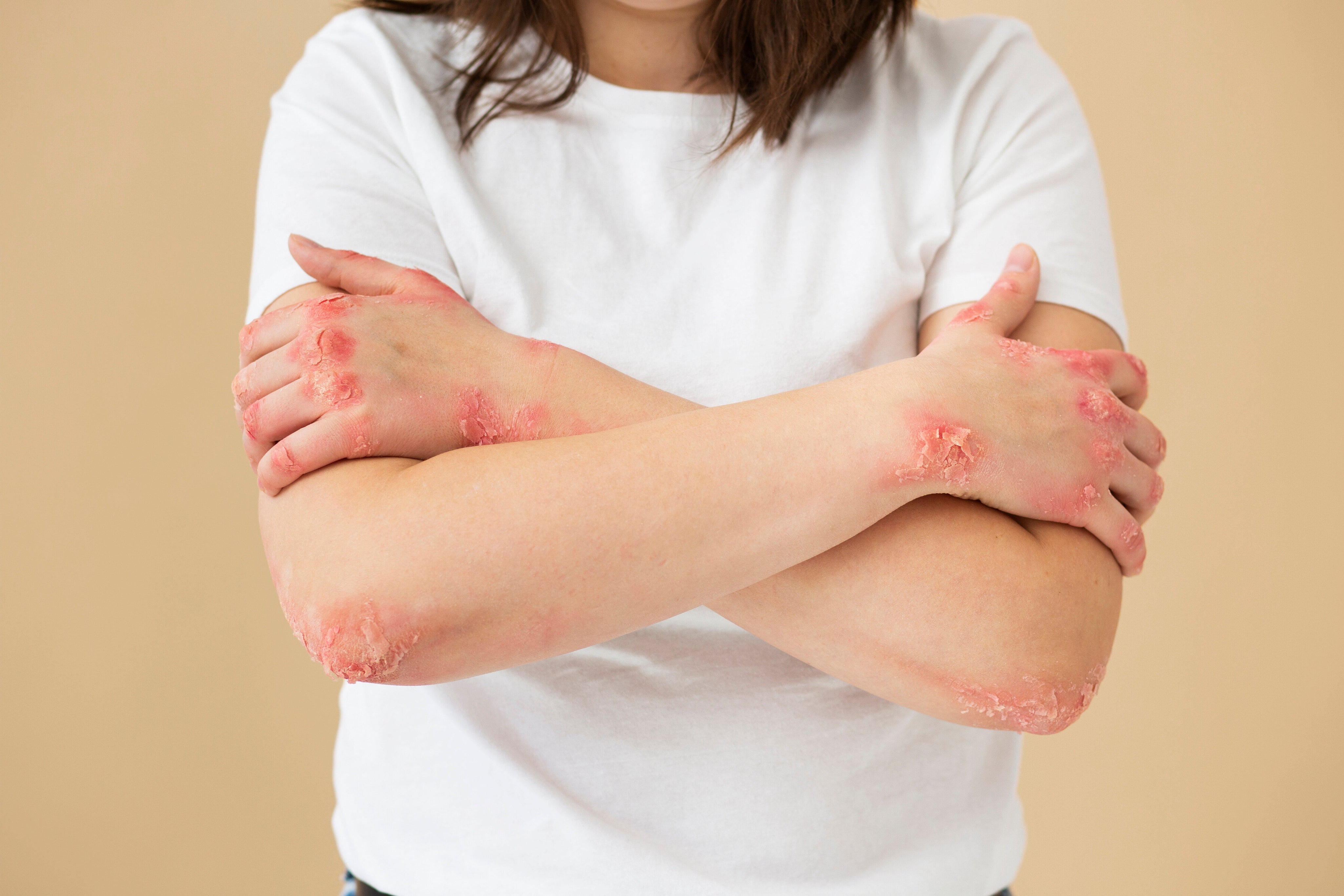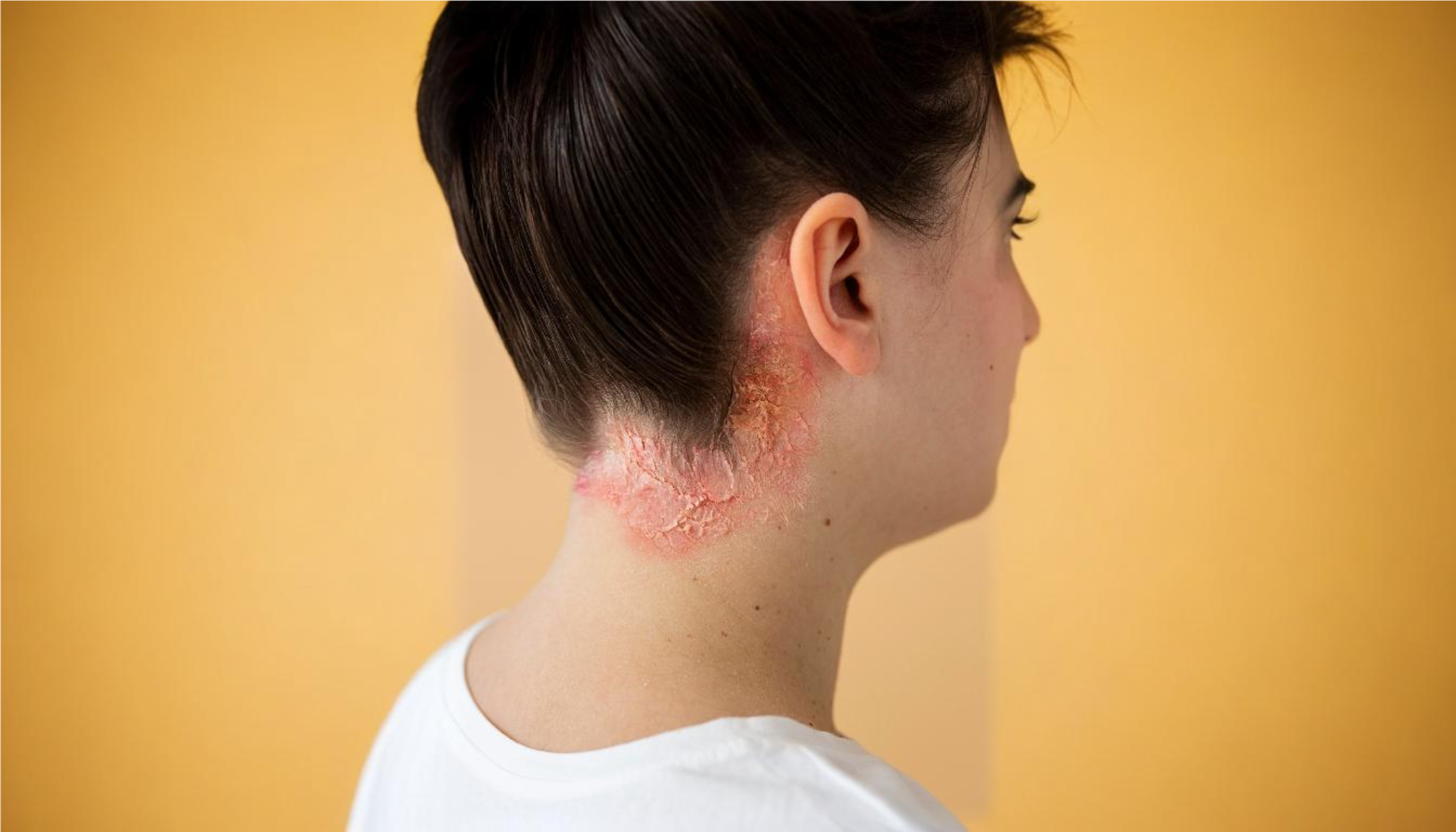Different Types of Psoriasis: What You Need to Know

Psoriasis is a chronic skin condition that causes the immune system to accelerate skin cell production, leading to red, scaly patches. Understanding the various types of psoriasis is essential for effective management and treatment. This guide will explore the different types, their symptoms, and treatment options.
Types of Psoriasis

1. Plaque Psoriasis
Plaque psoriasis is the most common form, characterised by raised, red patches covered with silvery-white scales. It typically occurs on elbows, knees, lower back, and the scalp. The plaques may itch or cause discomfort.
2. Guttate Psoriasis
Guttate psoriasis often begins in childhood or young adulthood. It appears as small, drop-shaped lesions on the trunk, arms, legs, and scalp. This type is usually triggered by bacterial infections such as strep throat.
Read more: How to Treat Scalp Psoriasis: Expert Tips and Solutions
3. Inverse Psoriasis
Inverse psoriasis presents as bright red, shiny lesions in skin folds, including under the breasts, in the groin, and around the buttocks. It tends to be less scaly than other types.
4. Pustular Psoriasis
Pustular psoriasis features white pustules (blisters of non-infectious pus) surrounded by red skin. It can occur in localized patches or cover large areas of the body. This type can be triggered by stress or certain medications.
5. Erythrodermic Psoriasis
Erythrodermic psoriasis is a severe, inflammatory type that affects most of the body with a red, peeling rash that can itch or burn intensely. It requires immediate medical attention due to the potential for serious complications.
Common Symptoms of Psoriasis
Understanding the symptoms associated with psoriasis is pivotal for proper diagnosis and treatment. While the manifestation of psoriasis varies across its different types, several common symptoms emerge as hallmark indicators of this condition. Here are the most common shared symptoms that frequently accompany psoriasis:
1. Silvery Scales
One of the most noticeable signs of psoriasis is the accumulation of dead skin cells, which forms distinct silvery scales on the skin’s surface. These scales can flake off, leaving behind red and inflamed skin underneath, contributing to both the physical and emotional discomfort experienced by those affected.
2. Red Patches of Skin
Inflamed red patches are a hallmark symptom of psoriasis. These patches can vary in size and are often surrounded by silvery scales, creating a striking contrast. The presence of these patches can lead to itchiness and irritation, making them not only visually evident but also uncomfortable.
3. Dry, Cracked Skin
The impacted areas of the skin may become extremely dry and cracked, resulting in painful fissures. This dryness can exacerbate discomfort and can be particularly troublesome in areas that experience friction or pressure, such as the elbows or knees, making everyday activities more challenging.
4. Pitted Nails
Psoriasis doesn’t only affect the skin; it can also have an impact on the nails. Individuals may experience pitting, which are small depressions on the surface of the nails. Additionally, discoloration and separation from the nail bed can occur, leading to further complications and a change in the appearance of the nails. This can affect self-esteem and how individuals perceive their overall health.
Who Gets Psoriasis?
Psoriasis can affect anyone but is more common in adults. Genetic factors, environmental triggers, and immune system dysfunction all play roles in its development.
Treatment Options for Psoriasis
Topical Treatments
- Corticosteroids: These anti-inflammatory medications are commonly used to reduce inflammation in the skin and can effectively slow down the overproduction of skin cells associated with various skin conditions. They come in various potencies, allowing for tailored treatment depending on the severity of the condition. However, long-term use may lead to skin thinning and other side effects, so they should be used judiciously.
- Vitamin D Analogues: These synthetic forms of vitamin D can help manage skin conditions by slowing down the rapid growth of skin cells and reducing scaling. They are particularly beneficial for conditions like psoriasis. Unlike corticosteroids, they carry a lower risk of side effects, making them suitable for long-term use. However, they may take several weeks to show noticeable results.
- Topical Retinoids: These vitamin A derivatives promote cell turnover, helping to shed dead skin cells and reduce inflammation. They are effective in treating acne and other skin disorders by preventing clogged pores and allowing new, healthy skin to emerge. While they can improve skin texture and appearance, retinoids can initially cause irritation and dryness, so patients are often advised to start with lower concentrations and gradually increase use.
Oral and Injection Treatments
- Methotrexate: Reduces the production of skin cells and suppresses the immune system.
- Cyclosporine: An immunosuppressant that can help control severe psoriasis.
- Apremilast (Otezla): A medication that reduces inflammation and slows skin cell growth.
Lifestyle and Home Remedies
1. Keep Skin Hydrated with Creams or Oils
Maintaining hydration is crucial for your skin’s health. Moisturisers, whether in the form of creams or oils, can significantly alleviate dryness and scaling, helping to create a protective barrier that locks in moisture. Look for products containing ingredients like hyaluronic acid or glycerin, which are known for their hydrating properties.


2. Use Epsom Bath Salts
Soaking in Epsom salts can provide soothing relief for irritated skin. The magnesium sulfate in Epsom salts helps to reduce inflammation and soothe discomfort. For the best results, add a cup or two of Epsom salts to your warm bath and soak for about 15-20 minutes, allowing your skin to absorb the healing properties.
3. Avoid Common Triggers
Identifying and steering clear of common skin triggers is essential for maintaining healthy skin. Factors like stress, smoking, and alcohol can exacerbate skin conditions. Keep a journal to track your skin’s responses to various triggers, and aim to adopt a healthier lifestyle by managing stress through relaxation techniques and eliminating harmful habits.
4. Eat Anti-Inflammatory Foods
Your diet plays a vital role in your skin's health. Incorporate anti-inflammatory foods rich in omega-3 fatty acids, such as fatty fish (like salmon and mackerel), walnuts, and flaxseeds. These foods can help reduce inflammation and promote overall skin health. Additionally, consider adding plenty of fruits and vegetables to your diet, as they are packed with antioxidants that support skin repair.
5. Manage Stress Levels
Stress is a significant factor that can lead to skin flare-ups. Practicing relaxation techniques such as yoga, meditation, or deep-breathing exercises can help manage stress levels effectively. Establish a daily routine that includes time for relaxation and self-care, which can significantly improve your skin’s appearance and overall well-being.
When to Consult Professional Help for Psoriasis
If you are experiencing severe symptoms, persistent lesions, or any signs of infection, it is crucial to consult with a healthcare provider or dermatologist as soon as possible. They can provide a thorough assessment and recommend appropriate treatment options tailored to your condition. Don't hesitate to seek professional advice to ensure your health and well-being are prioritized.
Experience Transformative Care with Skin to Heart
At Skin to Heart, we comprehend the profound connection between your skin's health and your overall well-being. Our sophisticated approach blends our varied range of skincare treatments with personalised care, meticulously curated to cater to the unique nuances of psoriasis and other skin conditions and concerns. Discover more about your skin's health and how to enhance its natural beauty by consulting with our skin experts.
Don't let skin conditions like psoriasis hold you back from living your best life. Take control of your skin's health and embark on a journey towards healthy, radiant skin with Skin to Heart. Visit us today and let Skin to Heart illuminate your path to radiant, serene skin.
- Tags: psoriasis sensitive skin
0 comments

